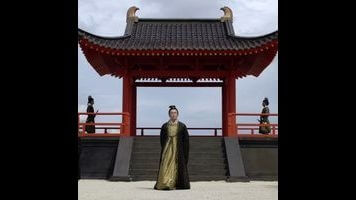At the heart of this episode’s promising direction is the impending clash between Jia Sidao, the Chancellor of the Song dynasty, and Kublai Khan, the Mongolian leader of the Yuan dynasty. Now that the Emperor of the Song dynasty has died, Sidao is prepared to bolster his army and resist any attacks from Kublai Khan. The Cricket Minister has so far been positioned as a tactical leader, but early on in this episode, we’re witness to his ruthlessness. Examining his army, he calls out the fiercest warrior, a man who has mastered the five animal styles of Shaolin. Sidao challenges him to a fight, insisting that if the warrior can beat him, he will be given a command post “with all of it’s residual income and pleasures.” If Sidao defeats him though, the warrior will become his chamber boy. With one hand behind his back, Sidao defeats the warrior, but rather than make him his chamber boy, he kills him on the spot. He’s asserting his dominance, doing what he can to immediately change his reputation as The Cricket Minister, whose study of praying mantis kung fu is chided as a “curios little hobby” amongst the soldiers. The scene gives us insight into the mental and physical strengths of Sidao, and it gives Chin Han a chance to inject the character with a steely confidence. It’s a scene that changes the dynamic of the show’s central conflict between Khan and the lone Song dynasty holdout, the city of Xiangyang. Kublai Khan and Jia Sidao remain the show’s most interesting and complex characters, and both Benedict Wong and Chin Han are revelling in their roles, bringing a commanding presence and magnetism that’s lacking elsewhere.
Kung fu, which Hundred Eyes describes as “supreme skill from hard work,” is the central theme of “Feast.” Previous episodes have felt haphazardly stitched together, but “Feast” is wonderfully interwoven in terms of its thematic explorations, giving us a better sense of the conflicts and relationships that will lead to political, emotional, and physical confrontations as the season progresses. Kung fu is about patience, study, and the cohesiveness of mind and body, and the consistent mention of the spirit of kung fu is meant to contrast the splintering of those within the ranks of Kublai Khan’s empire. There’s tension between the Chinese and Mongolians within his ranks, embodied most clearly by his son, Prince Jingim. Since the failed attack that came at the end of the first episode, an attack led by Jingim, he’s been lambasted for his weakness and lack of leadership. In this episode, he is sent to a feast thrown in the Khan’s honor by Kaidu, the Khan’s cousin. There, Jingim is continually chided for his weakness and insufficiency in battle. Much of that criticism is tied to his mixed heritage, equal parts Mongolian and Chinese, and like last episode’s outstanding scene between Kublai Khan and his brother Ariq, the lengthy feast scenes, underscored with racial and political tension, add another layer of conflict that deepens our understanding of the storyline and what’s at stake for many of these people. This isn’t just men wanting to show their dominance and be part of a ruling empire. There are deeply-rooted historical and personal motivations at play here, and that makes for compelling drama.
With that said, the rest of the episode is largely dedicated to Marco Polo, and as has been the case early on this season, his journey is the least interesting part of the show. Marco, who spends one half of the episode trying to figure out the mystery that is the Blue Princess, and the other half having sex with Kaidu’s daughter (named Khutulun), is still a shell of a character. While much of Marco Polo borders on ludicrous in terms of its narrative, there are at least promising signs that the writers have a sense of the political and emotional motivations behind Khan’s ongoing empire building and Sidao’s resistance. With Marco, it’s yet to be seen what role he really serves, or what his goals may be beyond survival within the empire. We understand that Kublai Khan is learning to value the Latin’s verbose insights, which may help Khan understand the true feelings of his people. Other than that though, Marco may as well be a tertiary character, one who stumbles from scene to scene with little effect on the overarching story. It’s a shame, because the other storylines that make up “Feast,” the ones circling the momentum-killing black hole that is Marco Polo, present intriguing narrative possibilities for the rest of the season.
Stray observations:
- I’m still not sure whether the problem with Marco Polo is the writing for the character, or the lackluster performance of Lorenzo Richelmy. It’s likely a mix of both; Richelmy seems devoid of charisma, and Marco is hardly given anything of consequence to do. He’s merely a Venetian pawn in a much larger, and more compelling story.
- I don’t know if I can praise Wong and Han enough. They are doing wonderful work here as Kublai Khan and Jia Sidao, and I’m invested in the forthcoming power struggle.
- So I guess Marco is no longer romantically interested in the Blue Princess? That didn’t take long.
- As I stated above, Marco as a character is the least interesting part of this show, but his romp with Kaidu’s daughter does throw an interesting potential conflict into his storyline. To give Richelmy some credit, his bewildered “whoops” face when he finds out that Khutulun’s virginity is meant to be given to a warrior that can beat her in a fight was chuckle-worthy.
- As more evidence that Wong is doing the best work here, he shares a wonderful scene with Richelmy. Kublai Khan and Marco discuss the story of Cain and Abel, and Wong’s performance and body language is richly expressive, heavy with the weight of responsibility.

 Keep scrolling for more great stories.
Keep scrolling for more great stories.
